CSD-Materials Workshops
These self-guided workshops are tutorials intended to demonstrate the various tools of the CSD-Materials suite including Mercury, Mogul and features such as Aromatics analyser, Hydrogen Bond Propensity and Solvate analyser.
Tell us what you think!
We hope you found these workshops helpful. As we aim to continuously improve our training materials, we would like to hear your feedback. You can do so by filling out this survey. When asked, insert the workshop code that you find in the workshop description in this page. It will only take 5 minutes and your feedback is anonymous. Thank you!
Introduction to Full Interaction Maps
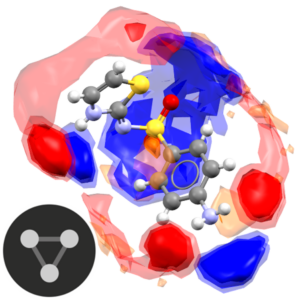
This is a self-guided workshop on how to use the full interaction maps for exploring crystal structures; including assessing hydrogen bonding and substituent effects.
Prerequisites: This handout is also part of the CSDU module Analysing intermolecular interactions 101 – Full Interaction Maps. Visit the module webpage to learn more about FIMs, and for more demos and tips! Upon completion of the module, you can also earn a completion certificate.
Workshop code: MER-002
Advanced applications of Full Interaction Maps
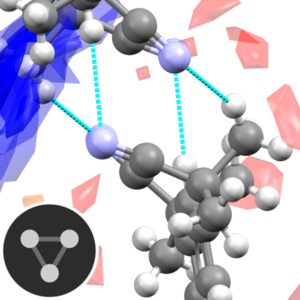
This is a self-guided workshop on how to use the full interaction maps for assessing polymorph stability and investigating the potential for co-crystallisation.
Prerequisites: This handout is also part of the CSDU module Analysing intermolecular interactions 101 – Full Interaction Maps. Visit the module webpage to learn more about FIMs, and for more demos and tips! Upon completion of the module, you can also earn a completion certificate.
Workshop code: MER-003
Hydrogen Bonds Statistics
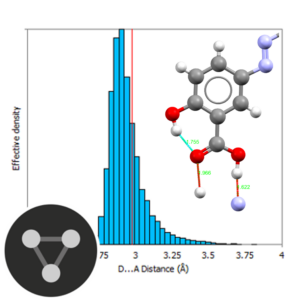
This is a self-guided workshop on how to use the hydrogen bonds statistics module in Mercury to investigate the hydrogen bonding network in structures and determine how usual or unusual are the motifs in your structure.
Prerequisites: Basic knowledge of Mercury, if you are new to Mercury, you can start with the Visualisation workshop – MER-001, try the CSDU module Visualization 101 – Visualizing structural chemistry data with Mercury
Workshop code: MAT-004
Exploring Hydrogen Bond Propensities
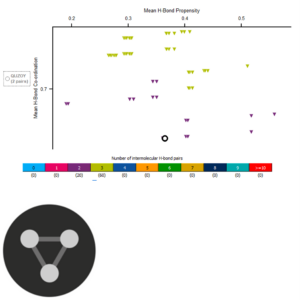
This is a self-guided workshop demonstrating the use of the Hydrogen Bond Propensity (HBP) tool in Mercury for understanding hydrogen bonding network in a system.
Prerequisites: Basic knowledge of Mercury, if you are new to Mercury, you can start with the Visualisation workshop – MER-001, try the CSDU module Visualization 101 – Visualizing structural chemistry data with Mercury
Workshop code: MAT-001
Investigating solid form stability: understanding Hydrogen Bond Propensities
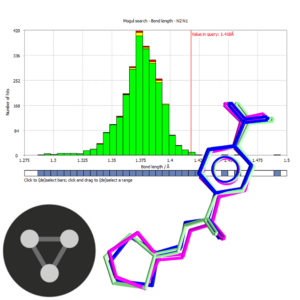
This is a self-guided workshop demonstrating the use of the Hydrogen Bond Propensity (HBP) tool in Mercury and molecular conformation exploration in Mogul for polymorph risk assessment.
Prerequisites: Basic knowledge of Mercury, if you are new to Mercury, you can start with the Visualisation workshop – MER-001, try the CSDU module Visualization 101 – Visualizing structural chemistry data with Mercury. The Exploring Hydrogen Bond Propensities workshop – MAT-001 is a recommended introduction to the Hydrogen Bond Propensity tool.
Workshop code: MAT-007
In-Depth Comparison of Polymorphic Structures Using Mercury
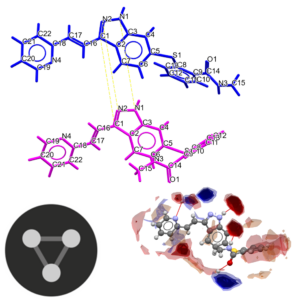
This is a self-guided workshop demonstrating how to compare polymorphs using various tools in the CSD-Materials suite.
Prerequisites: Basic knowledge of Mercury, if you are new to Mercury, you can start with the Visualisation workshop – MER-001, try the CSDU module Visualization 101 – Visualizing structural chemistry data with Mercury
Workshop code: MAT-008
Motifs and Crystal Packing Feature Search in Mercury
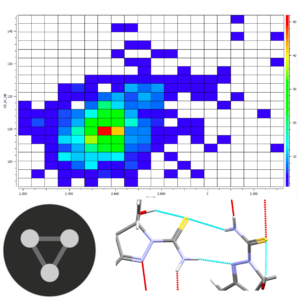
This is a self-guided workshop demonstrating how to analyse hydrogen-bonding interactions and packing trends in crystal structures using the features under the CSD-Materials search in Mercury.
Prerequisites: Basic knowledge of Mercury, if you are new to Mercury, you can start with the Visualisation workshop – MER-001, try the CSDU module Visualization 101 – Visualizing structural chemistry data with Mercury
Workshop code: MAT-006
Evaluating Crystal Packing Similarity in Mercury
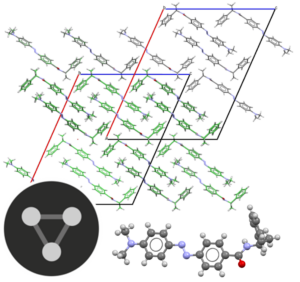
This is a self-guided workshop demonstrating how to evaluate packing trends in crystal structures using the Crystal Packing Similarity tool under the CSD-Materials search in Mercury.
Prerequisites: Basic knowledge of Mercury, if you are new to Mercury, you can start with the Visualisation workshop – MER-001, try the CSDU module Visualization 101 – Visualizing structural chemistry data with Mercury
Workshop code: MAT-009
Hydrate Analyser
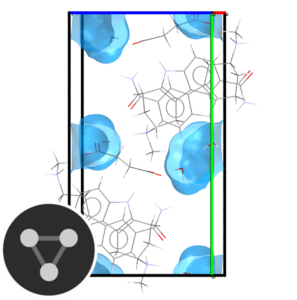
This is a self-guided workshop demonstrating the use of the hydrate analyser in Mercury to investigate different hydrate stoichiometries, analyse hydrate polymorphs and coordinates.
Prerequisites: Basic knowledge of Mercury, if you are new to Mercury, you can start with the Visualisation workshop – MER-001, try the CSDU module Visualization 101 – Visualizing structural chemistry data with Mercury
Workshop code: MAT-002
Solvate Analyser
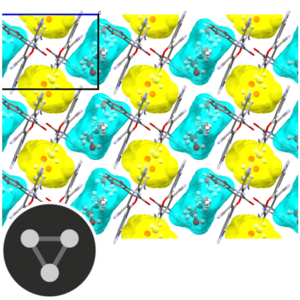
This is a self-guided workshop demonstrating the use of the solvate analyser in Mercury to investigate hydrogen bonding motifs in solvate structures and analyse disordered solvents.
Prerequisites: Basic knowledge of Mercury, if you are new to Mercury, you can start with the Visualisation workshop – MER-001, try the CSDU module Visualization 101 – Visualizing structural chemistry data with Mercury
Workshop code: MAT-003
Aromatics Analyser
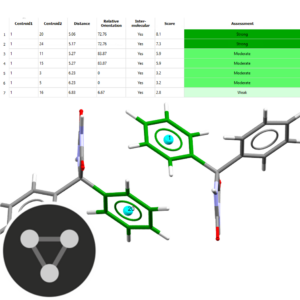
This is a self-guided workshop demonstrating how to visualize aromatic interactions in a crystal structure, assessing the strength of such interactions and investigating aromatic interactions for polymorphs.
Prerequisites: Basic knowledge of Mercury, if you are new to Mercury, you can start with the Visualisation workshop – MER-001, try the CSDU module Visualization 101 – Visualizing structural chemistry data with Mercury
Workshop code: MAT-005
Introduction to the Conformer Generator in Mercury
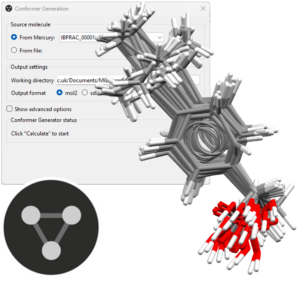
This is a self-guided workshop demonstrating how to use the CSD Conformer Generator in Mercury both through the CSD-Materials menu and a script from the CSD Python API menu.
Prerequisites: Basic knowledge of Mercury, if you are new to Mercury, you can start with the Visualisation workshop – MER-001, try the CSDU module Visualization 101 – Visualizing structural chemistry data with Mercury
Workshop code: CONF-001